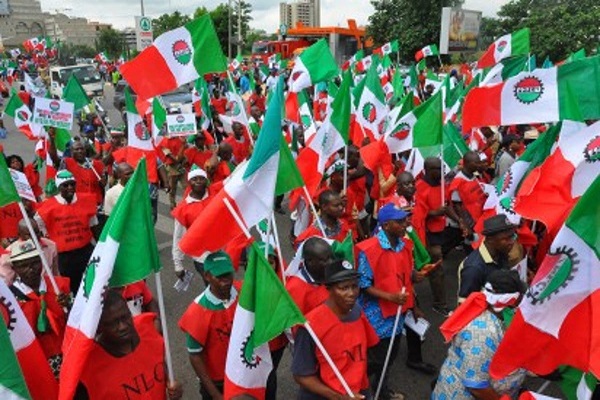By Dr. Jumai Ahmadu
The Nigeria Labour Congress (NLC) has a long history of advocating for wage increases and improved working conditions for Nigerian workers. The NLC, founded in 1978, is the umbrella organization for trade unions in Nigeria and has played a significant role in championing the rights of workers across various sectors. Here is a brief overview of the NLC’s history of agitation for wage increases:
In its early years, the NLC focused on fighting for better wages, improved working conditions, and social justice for Nigerian workers. The organization quickly became a key player in advocating for the rights of workers and engaging in negotiations with the government and employers on behalf of workers.
1981 General Strike:One of the most notable instances of the NLC’s agitation for wage increase was the 1981 general strike. The NLC organized a nationwide strike to demand a 120% increase in the minimum wage, among other issues. The strike paralyzed the country and demonstrated the NLC’s ability to mobilize workers for collective action.
Again in 1991, the NLC led a mass protest against the Nigerian government’s economic policies, including proposed increases in fuel prices and taxes. The protest culminated in a three-day nationwide strike, during which the NLC called for improved wages and living conditions for workers.
In 2000 the NLC played a crucial role in advocating for the implementation of a national minimum wage in Nigeria. In 2000, the NLC successfully negotiated with the government to establish a minimum wage to ensure that all workers received a baseline level of compensation.
Over the years, the NLC has continued to press for wage increases for Nigerian workers in various sectors, including the public sector, private sector, and informal economy. The organization has engaged in negotiations, strikes, protests, and other forms of advocacy to push for better wages and improved working conditions.
The NLC is currently on a nationwide strike in agitation for wage increase to address the impact of inflation, rising living costs, rise in electricity tariff and economic challenges facing Nigerian workers.
To address these problems government should consider wage parity among all federal government owned institutions since salaries are being paid from the same source (Federation account).
Wage parity refers to the principle of ensuring that individuals receive equal pay for equal work, regardless of factors such as gender, ethnicity, or other non-performance-related characteristics.
It involves eliminating wage disparities based on discriminatory practices and ensuring that all employees are compensated fairly and equitably for their contributions. Wage parity aims to promote fairness, equality, and non-discrimination in the workplace by ensuring that individuals are paid based on the nature of the work they perform rather than on irrelevant factors.
Wage parity can indeed play a significant role in addressing the problem of industrial action by Nigerian workers for several reasons. When workers are paid fairly and equally for the same work regardless of where they work, it can help foster a more harmonious and productive work environment and drastically reduce corruption in the public sector.
We have a situation currently where a retired Director in the main stream service gets a little over one hundred thousand naira as his monthly pension (no thanks to the contributory pension scheme) where his counterpart in government parastatal get over three hundred thousand naira outside the humongous retirement benefits.
Here are a few key reasons why wage parity can help alleviate the issues that lead to industrial action:
1. Promotes Fairness and Equity:
Wage parity ensures that all workers are compensated equally for the same work, which promotes a sense of fairness and equity among employees. When workers feel that they are being treated fairly, they are more likely to be satisfied with their jobs and less likely to engage in industrial action to demand better pay.
2. Reduces Resentment and Conflict:
Wage disparities can create resentment and conflict among workers, especially if some employees feel that they are being unfairly paid less than their counterparts in different government owned institutions for the same work . By implementing wage parity, government can avoid these tensions and create a more peaceful and harmonious work environment.
3. Increases Employee Motivation and Engagement:
Fair and equal pay can increase employee motivation and engagement. When workers feel that their efforts are being rewarded fairly, they are more likely to be motivated to perform well and contribute positively to the development of our dear Country. This will be in line with our old new National Anthem that started that we should build a nation where no man is oppressed. This, in turn, can help reduce the likelihood of industrial action as workers are more satisfied with their compensation.
Recall that the former President Muhammadu Buhari stating that Nigerian workers should clamour for pay parity instead so everyone will be paid equally since all Nigerian workers attend the same market, send their children to the same school pay the same electricity bill etc.
Though the Head of Service of the Federation, Dr. Folasade Yomi-Esan, has set up a committee to work out the implementation of this policy we are yet to see the outcome of the committee’s assignment.
We can have a uniform wage for all public officers but peculiar allowances can be given based on individual job schedules.
In conclusion, wage parity is a crucial element in addressing the root causes of industrial action by Nigerian workers. By implementing fair and equal pay practices, companies can promote fairness, reduce conflict, increase motivation, improve retention, enhance their reputation, comply with labor laws while preventing disputes, and foster a positive work culture.
Dr. Jumai Ahmadu, Ag. Director Reform Coordination and Service Improvement, FCTA




